
Understanding the External Environment
Changing Patient Demographics
Non-communicable diseases (NCDs) like cancer, cardiovascular disease and diabetes are difficult-to-treat conditions that are often associated with lifestyle factors like diet and exercise. They are also linked to urbanization and rates of life expectancy around the world.
We recognize the link between human health and these changing demographics. As the world's middle class grows at an unprecedented rate, new consumption translates to a larger carbon footprint. At Pfizer, we have publicly recognized the impact of climate change on human health and have made commitments to mitigate our impact through the reduction in greenhouse gas (GHG) emissions.
Pfizer looks to incorporate the Task Force for Climate-related Financial Disclosures (TCFD) framework in 2019. Environment (PiE) Program. In 2018, our PiE program continued to focus on wastewaters from antibiotic manufacturing operations through the completion of environmental risk assessments (ERAs). ERAs have been completed for all internal antibiotic manufacturing sites and all external suppliers in India and China; assessments are underway for all other antibiotic suppliers globally. As a result, Pfizer has enhanced, and continues to enhance, operational practices at both our own and supplier facilities. At some locations, further assessment, including sampling, is underway. In 2018, we also partnered with technical consultants to explore additional antibiotic wastewater treatment options. This year, Pfizer also continued our leading role as part of the Antimicrobial Resistance (AMR) Industry Alliance manufacturing group (the Alliance Manufacturing Group). Refer to the infographic below for progress made in 2018 with respect to AMR Industry Alliance commitments. To learn more about Pfizer's policy position on AMR, including antibiotic manufacturing, refer to here, and to learn more about the AMR Industry Alliance related to manufacturing and the environment Click here to learn more about meeting our environmental sustainability goals.
Pricing
Health care systems and budgets are continually adapting to address new pressures and strains, such as aging patient populations with increased health care needs or breakthrough therapies with high upfront costs.
In emerging markets, where the middle class increasingly expects the government to provide quality health care, the focus on access to innovative treatments has led to greater discussion around affordability. As a result, many governments, payers, insurers, patient groups and other stakeholders are looking for ways to reduce the costs of health care through regulation and other means.
At Pfizer, we know that investing in medicine delivers critical value to communities around the world - increasing workplace productivity, avoiding more costly health care interventions, and most importantly, improving a patient's overall quality of life.
The following commitments guide our approach to pricing our medicines at launch and beyond:
- Access: Ensuring patients have access to the medicines they need
- Innovation: Providing incentives for continued investment in the development of new medicines, vaccines and delivery systems to serve unmet health needs
- Impact: Making medicines available to meet the world's most pressing health problems
Making Our Medicines Accessible to the Patients Who Need Them
Pfizer is addressing access issues on multiple fronts, leveraging our people, resources and creative commercial strategies to develop sustainable, responsible solutions.
Innovating to Advance Global Health Access
PATH's Partnership with the Pfizer Foundation, the Peruvian Government and Local Cancer Organizations Bring Early Breast Cancer Detection Services to Women
Healthy Families, Healthy Futures: Improving Access to Immunization and Family Planning for Women and Children in Africa
Spotlight on Biosimilars
Biosimilars have the potential to increase patient access to therapeutically valuable treatments.
- Biosimilars provide more treatment options for health care providers and health care systems
- Broader patient access to these important therapies may help create long-term cost savings and efficiencies for health systems, freeing up resources for other important aspects of care
- Pfizer continues to build upon its heritage of innovation in biosimilars to create an environment in which physicians have more treatment options and patients have improved access to medicines
Trust and Expectations
In 2018 the pharmaceutical industry continued its efforts to rebuild and advance public trust, addressing reputational challenges around safety and pricing while restoring credibility in the eyes of key stakeholders.
At Pfizer, earning and maintaining patient trust has always been a critical part of our mission to bring life-changing therapies to transform millions of lives. We're working hard to live up to the trust that patients put in our products and services, and more than ever, we're working to increase transparency around the strong ethical values that guide our innovation, development, promotion and distribution.
From the way we conduct our business to the way we interact with the health care community around the world, Pfizer is committed to the highest levels of quality, compliance and integrity.
How we embody these commitments each day:
- In 2018, we continued our Access Accelerated partnership to address the growing burden of non-communicable diseases in low- and lower-middle-income countries. We worked as part of a multi-stakeholder group to draft a Cancer Law in Paraguay that would create a national cancer control program. While additional steps are still needed, President Abdo Benítez has committed a $50 million budget for 2019 to implement the law, with an expectation of increase in subsequent years
- As a member of the International Federation of Pharmaceutical Manufacturers and Associations (IFPMA), we adopted a new industry Code of Practice that became effective beginning 2019. The Code bans gifts and promotional aids for prescription medicines, wherever IFPMA member companies operate, and calls for strong ethical values to build a culture of trust
- We continue working across the health care industry to find new approaches to encourage the use of preventive therapies that could help reduce overall health care spending
Antimicrobial Resistance
Meeting Our Commitments as a Responsible Manufacturer of Antibiotics
Pfizer Tackles Antimicrobial Resistance

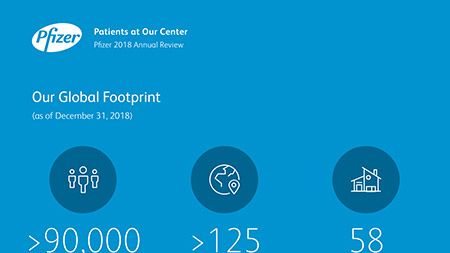
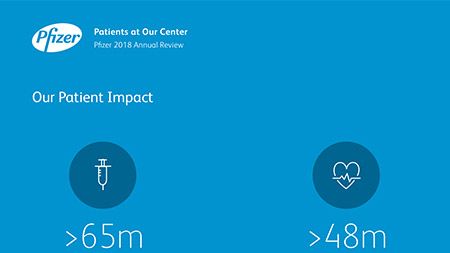
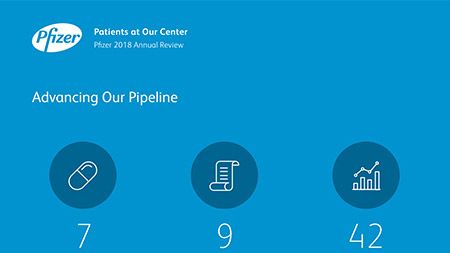
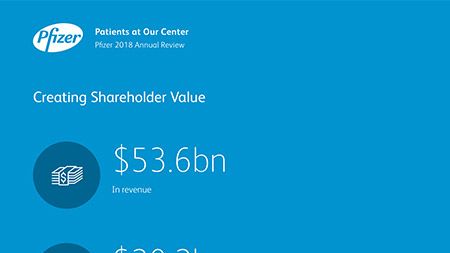
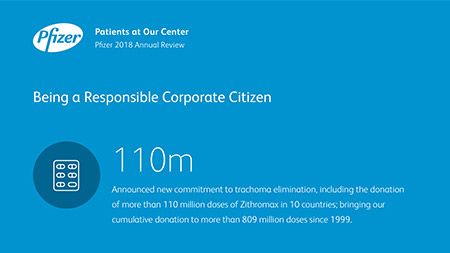
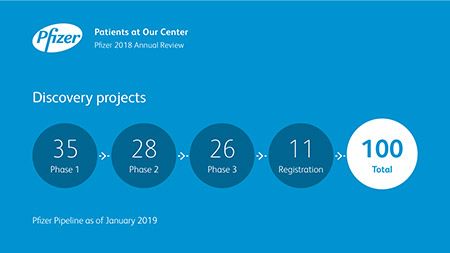
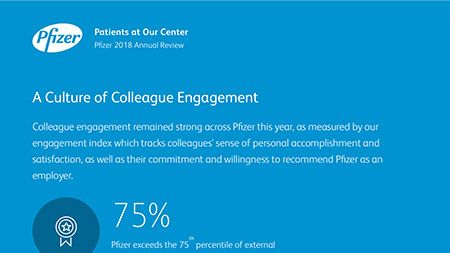
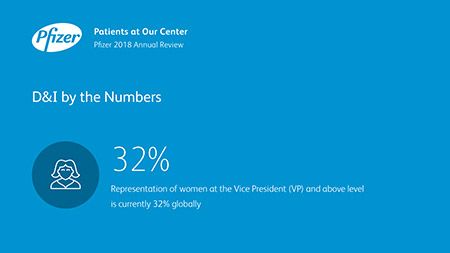
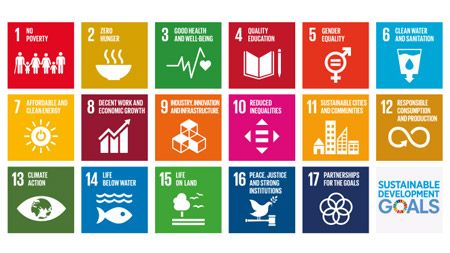
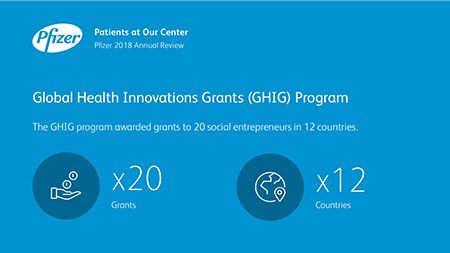



Ian Read: Contributions to Improving Human Health
Albert Bourla: Breakthroughs that Change Patients' Lives
Ushering in a New Era of Pfizer R&D Productivity
Advancing Our Leading JAK Science
Overcoming Therapy-Resistant Disease
Tackling Respiratory Syncytial Virus (RSV) Through Breakthrough Science and Technology
Catalyzing Innovations in Global Health
Contributing to the UN Sustainable Development Goals
Supporting Digital Health Start-Ups
Improving the Health of Women and Their Families